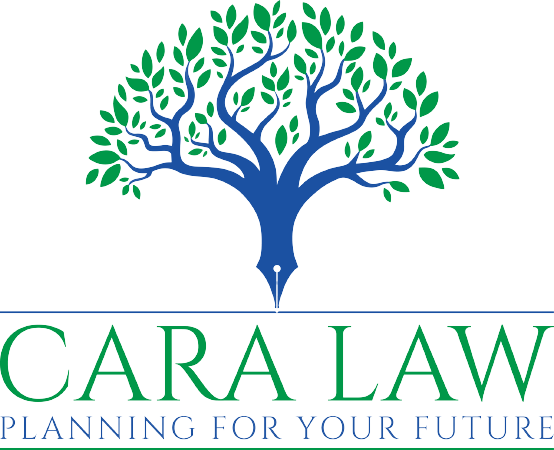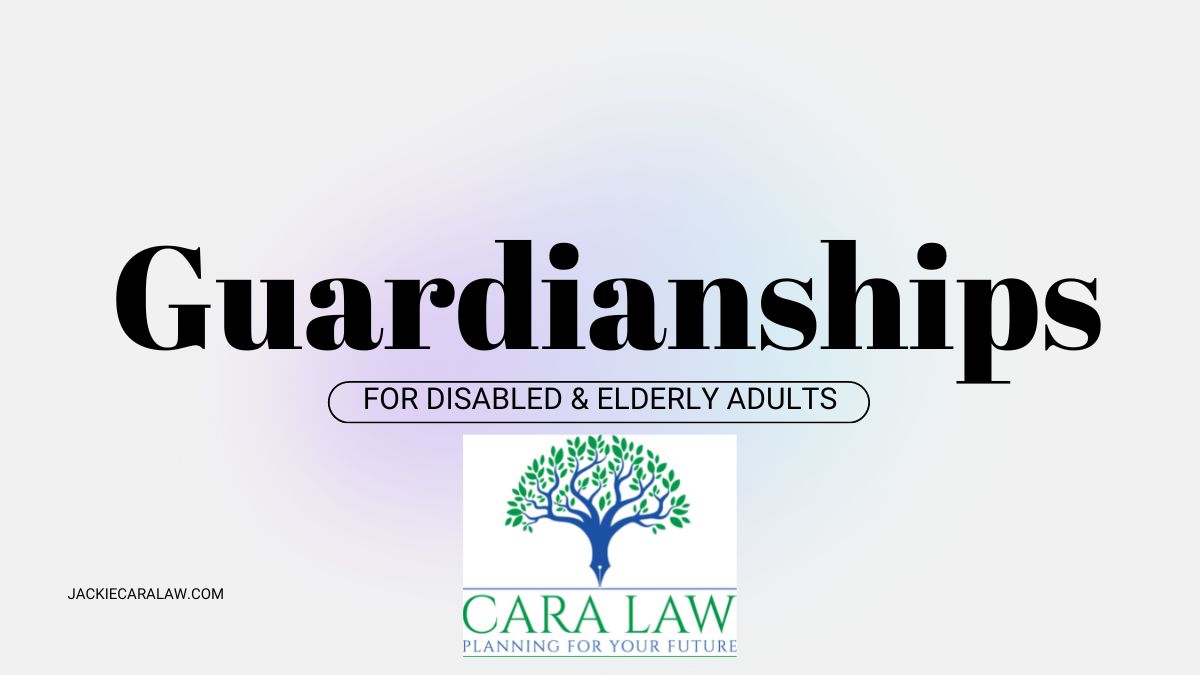1. Why are Guardianships Brought?
There are many varied scenarios that might lead to the filing of a guardianship petition. Some
seem very clear and the parties are in agreement about what has to happen. In other cases, it is not clear that the person who is the subject of the guardianship (called the Alleged Incapacitated Person or AIP) needs a guardian or there are cases when the need for a guardian is clear but who will act as guardian is hotly contested.
Appointing a guardian for the personal and property needs of another person is akin to taking a person’s most cherished rights from them and allowing someone else to “step into their shoes” to exercise those rights. Unlike a power of attorney, which appoints an agent to make financial decisions when you can’t, a guardian’s appointment takes the place of the AIP’s decision making abilities. Your Power of Attorney acts along side you. Your guardian acts in your place.
Guardians can be appointed to:
- manage a person’s day to day needs, like hiring caregivers,
- agreeing to medical care,
- paying bills and handling their finances.
- In severe cases, a guardian may be appointed to relocate the individual or to keep them safe from someone dangerous in their environment.

Parents may consider bringing a guardianship proceeding as their differently-abled children approach adulthood.
Guardianship Proceedings can involve adults or soon to be adults who have limitations that require assistance with activities of daily living (things like cooking, cleaning, dressing) medical decision making, financial decision making and more.
Guardianship Proceedings are common when a family has a child with developmental or other disabilities who is about to transition to adulthood and are designed to allow continuation of assistance from childhood to adulthood.
I have recently been working with a client who is the mother to a beautiful daughter who is about to turn 18. While her daughter is able to be independent in many ways, she was born with a neurological disorder where one side of her brain doesn’t communicate with the other side, so processing information is challenging for her. As her 18th birthday approached, her mom started to realize all of the things she did for her daughter that she was able to do because she was her mom. Once her daughter turned 18, that would be very different. We filed to have the court appoint my client as guardian for her daughter. Her daughter understood and agreed to the appointment and was in court to speak to the judge at the hearing.

They are also common as older people begin to develop dementia or other debilitating diseases and disorders and don’t have advanced directives in place. Sometimes a family becomes concerned about a family member who is experiencing issues with mental illness, addiction or sudden onset conditions. Each type of proceeding brings unique challenges and solutions.
2. What is the process of gaining guardianship – Where should I start?

The first step in gaining guardianship, whether you want to be guardian or another interested person is willing to act, is speaking with a qualified attorney with experience in guardianship cases. Guardianship is a niche area of law and not all attorneys are familiar with the process and customs of the proceedings. Many guardianship attorneys also practice in areas such as elder law or estate planning. That attorney will likely discuss these steps with you but will also delve deeply into the facts of your particular case.
Choose a guardianship attorney who understands the law and your concerns. Having a relationship of trust with your advisor is very important in this area of law.
In guardianship cases, the facts of the case are very important. The court will want to know specific details of how, when and why the AIP is at risk or in danger as well as details about why the AIP is unable to make the decisions needed to avoid risk or danger. In clear cases, a case might be brought by a hospital asking the court to appoint a guardian when the person in their care is unable to make medical decisions on their own behalf.
To prepare for your first discussion with your attorney, you will want to have a specific and detailed list of incidents that have you concerned.
The attorney you are working with will prepare a series of documents which will become the basis of the proceeding. These documents are very specific and each satisfies a particular purpose. Proceedings must be served on interested parties to the AIP. This means, siblings, parents, children, spouses, close friends, powers of attorney, bankers, medical treatment providers and more. How a matter is served upon those interested and the AIP is specific and must be complied with before a case can begin. The main document of the proceeding is a petition. The petition, which will be signed by the person who is asking for a guardian to be appointed, will be prepared by your attorney, but signed by you, with the facts and details supporting the appointment of the guardian.
3. What happens next?
After the Petition is filed with the court and served on all of the necessary people or agencies, the court will appoint someone to act as a Court Evaluator. A Court Evaluator is generally regarded as the “eyes and ears” of the court. A neutral party, the evaluator is tasked with confirming proper service of documents on all of the parties, speaking to all of the interested parties, meeting with the AIP, speaking to doctors, reviewing bank and medical records and reporting on where the AIP lives.
Court Evaluators prepare a report to the court, which becomes part of the record once the matter proceeds to a hearing.
Sometimes the court appoints counsel for the AIP, an attorney who represents the person who is the subject of the guardianship. Counsel can be a private practicing attorney or an agency appointed with representing AIPs in proceedings. This attorneys’ job is to speak to their client, understand what their client wants and zealously represent those interests in a hearing. An AIP is always permitted to hire their own attorney whether one has been appointed for them or not.
4. What if the guardianship is an emergency?

Sometimes guardianships come amidst an emergency and someone must be appointed to act immediately.
Guardianships are usually emergent and require quick resolution and attention from the court. Where there are serious and imminent circumstances, the court may appoint a temporary guardian with limited powers to address the matter at hand, while the rest of the proceeding continues. Examples might be a pending eviction, an emergency surgery, troubling financial conditions, etc.
5. Do I have to go to Court?
Yes. In almost every guardianship there is a hearing. Infrequently, the parties might proceed to a mediation, but it isn’t how most proceedings are resolved. Mediation might be an appropriate remedy when family members are fighting amongst themselves in a guardianship, which does happen.
In a guardianship case, although the AIP does have the right to a trial by jury, it is very rare. In most cases, the parties convene in the courtroom with the Judge and discuss the merits and details of the proceeding. Unless the AIP is unable to meaningfully participate in the proceedings.
It is especially important that you be in court if you are seeking any part of the guardianship appointment. The court or your attorney will ask you “qualifying questions” to approve you for guardianship. People with criminal history, financial malfeasance, abuse allegations or are unable to qualify for a bond to protect the IP’s money, are unlikely candidates for guardianship appointments.
6. Will I have to testify?
If you are the petitioner in the proceeding you will have to testify about the things we put in your petition. As the petitioner, you are one of the people in the best position to know why the person you are concerned about needs the assistance of a guardian and how you believe that person would best be helped.

Testimony in a guardianship matter is important to the court’s decision making. Many proceedings can have an informal feel to them.
7. Do I have to speak to the evaluator?
Yes, you absolutely do have to speak to the evaluator. Refusing to discuss the case with a court appointee can only reflect badly on the case you’ve brought. However, if you are represented by counsel, any discussions with the evaluator should be discussed with your attorney first.
8. What happens after the hearing?
First the court will make a determination about the person’s capacity. The AIP will now become a Person in Need of a Guardian (PING) or an Incapacitated Person (IP). Sometimes the court finds that the appointment of a guardian is not appropriate and the matter is dismissed.
Once a guardian has been appointed by the court, that guardian may have to be bonded, which basically means insured. The court will direct whether bonding is needed or how much the bond should be. Guardians must take an online training to qualify for the position. After the court issues its order, guardians must be commissioned, which is a term of art for authorized, by the court to act.
9. What can I do as a Guardian?

Family member guardians can make a huge difference in the lives of loved ones.
What powers are granted to the guardian by the court depend entirely on what is in the court order. Guardians can be granted many kinds of powers, from financial powers to personal and medical decisions. Speaking to your attorney and carefully reviewing the court order is important to understanding what you can and cannot do as a Guardian.
It is important to know that even with the power to act, many guardianship acts still must be brought before the court. Things like selling a house, moving the Incapacitated Person or making big financial changes, generally must be done with permission of the court.
Once you are appointed, you must qualify as guardian and you must file reports with the court. The first report must be filed within the first 90 days after commission. Thereafter, annual reports must be filed by the guardian each year.
Along with the appointment of the guardian, the court appoints a Court Examiner. A Court Examiner is appointed to oversee that the guardianship is carried out appropriately, particularly the financial aspects of the matter.
10. Who gets paid?
After the proceeding has been decided and the guardians have been appointed, the court will have ordered payment of the participants. If the IP or PING has money, these court ordered fees will be paid from the “guardianship estate.” A “guardianship estate” consists of the finances that the guardian is able to control according to the order of the court (the word for this is marshal). It is likely that counsel for the AIP, the Court Evaluator and Petitioner’s attorney will be paid from the guardianship estate. From time to time, the Court Examiner will also be paid from the guardianship estate.
If there is no guardianship estate, meaning the person who was the subject of the proceeding has no income or assets, sometimes the court will appoint a state approved agency, if one exists in your jurisdiction to serve or an attorney who agrees to handle the matter pro bono or the court will appoint a family member, who will not take guardianship commissions. Often in these cases, nobody’s fees are paid.
Cara Law Can Help
Guardianships can be for children, soon-to-be-adults, or older adults who have become ill or are showing signs of dementia. Guardianships are put in place with the help of a licensed attorney and the legal system to protect a person who is unable to make decisions for themselves without help.
Cara Law is an estate attorney and an expert in guardianships. If you have minor children, soon to be adult children with disabilities, or are caring for an elderly loved one, Cara Law can assist you with obtaining a legal guardianship for that person. Get in touch with us today and schedule your consultation to discuss your situation.
Schedule your appointment with us today.







